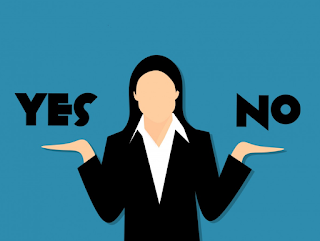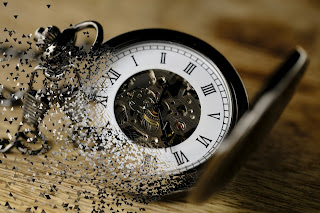The Illusion of Free Will
 |
| Credit: Mohamed Hassan. |
Have you ever thought that you might not be actually making any choices? Ever questioned the freedom of your will? Ever thought while you moved your hand to grab a glass of water that this was predetermined, given the fact that your body has lost water and gives you the illusory feeling of being free while extending your hand to drink? But before we talk about free will, it is necessary to think of the very definitions of the words "free" and "choice" in order to know what we're talking about. The word "free" implies the absence of pressures, the total "autonomy". OK what about the word "choice"? Choice means the ability to pick between various options, right? So if I could buy a red car or a blue car, I would say that I made a choice of color.
Alright, so how do our definitions relate to the argument against free choice? Well, I think it is quite simple: try to combine the two definitions together and you get a straight contradiction. After all, how can you be fully "free" (that is, without any pressures) and be limited by "choice"?! How are you free if I tell you that you only have a limited variety? Yes yes, I know what you're thinking now. OF COURSE we're not totally free! We have limited choices, but we're still free to choose among those choices. Alright, I'll go along with you. But before I go on, consider how many "degrees of freedom" do you really have in everyday life choices, and you will intuitively start to get what I mean.
The moment that choice is followed with reward or punishment, it no longer becomes free: It becomes an obligation. A child that goes to school because his parents would ground him otherwise is not really free to go to school, he's just running away from his parents' punishment. In other words, the moment that you reward or punish a choice, it no longer becomes free, it becomes an emotional instinct that is deeply engraved in our brains, which are shaped by evolution to escape threat, and maximize survival and reproduction. This leads us to another pillar of my argument. Whenever we speak about free choice, we mean rational choice, don't we? That is to say, if your choice was forced upon you by uncontrollable emotions of fear or thrive for happiness, would it mean anything to say "I freely chose this"?! I think all free-choice advocates would agree that choice is linked -almost inseparably- with rationality and intellect. But alas, we're not as rational as we think we are. It is well-known, using philosophical and neuroscientific arguments, that none of our actions or choices are purely rational. There's always an emotional component involved. Whether fear from the consequences, fear from authority, strive for reward ("conditioning", that is) or even influence from our own past memories. Even in apparently emotion-less choices, there's always an interaction between the prefrontal cortex (which is involved in rational reasoning) and the amygdala/limbic system (which is involved in the irrational emotions of fear, joy etc.). The question of why we even have irrational bits in our brains is a question of evolutionary biology, whose answer relates to the importance of quick response based on past experience, to maximize survival and reproduction. The love you feel towards your mother, the inherent fear you have from snakes (as all primates instinctively do) and the joy you get from the reproductive process, all but point towards an irrational drive towards biological survival.
Now let's take this one step further. Let's assume for the sake of argument that some of our "choices" are purely rational ... purely based on reasoning and weighing of the consequences. Even if this was the case, would this still be called "free choice"?! Would I say that a computer freely chose the solution to a problem? Would you say that the calculator freely chose to answer 1+5=6 because it could've given any other answer, but chose this one because it's the most rational?!! Of course not! But WHY?! Why don't you feel comfortable with the idea of calculators freely choosing the solutions to the equations you write in them?!
Aaah, I can almost hear you scream at me: "Calculators don't have a 'something' that does the choice!! Besides, mathematical equations have one definite answer, not a group of equally-rational options to choose from!". Let's examine these two claims a bit further. What does it even mean to say that human beings -unlike calculators- have something inside that is immaterial and makes their choices?! Isn't this plain dualism, which has been disproven using numerous neuroscientific data ages ago? And how come we can see the prefrontal lobe in action while humans are taking decisions? The problem with this "immaterial" argument is that it simply escapes the problem by assuming that there is someone else inside the brain that takes the decision for you. Instead of the simple, proven, observable, scientific concept that the brain is you. Yes that's right, scientifically-speaking, you are your brain. There is no one in there to take decisions for you, no immaterial "thing" that perceives things for you, just a billion neurons (and a trillion connections) that wire and re-wire according to new input and pre-set embryologic development. There are numerous arguments against dualism, some of them philosophical (eg, the problem of interaction - how does the immaterial thing actually translate into material things) and MANY of them, scientific. An elegant review of the scientific literature severely disputing dualism could be found in Francis Crick's book: The Astonishing Hypothesis, which was the subject of discussion at the Science and Philosophy Club last week.
Onto the next claim. What if the choice we make is between options that are rationally equal? Doesn't this make us different from calculators?! Actually, this claim is factually erroneous. Some mathematical equations actually have two or more solutions that are logically equal. For example, any quadratic equation (involving x squared) will have two solutions, one positive and one negative. Perhaps you're thinking: "There you go!! how come we make choice among these answers then?!". My response to you is very simple: we usually don't. Most of our decisions are choices in life that are based on rational reasoning, where one choice is more useful than another. Almost none of our everyday choices involves two decisions that are equally plausible. But let's assume we really did have so many of those equally-plausible options to choose from, what would our life look like if this was the case?! We know, from research in psychology and cognitive neuroscience, that it would be living hell. Just recall the situation where you last went to the supermarket and found 100 or more choices between things that are -essentially- equivalent in price and quality. Having to choose between various options that are rationally equivalent is actually paralyzing, and demotivating too!
But what would the universe look like if humans had free choice?! I know you're thinking: "What's my choice got to do with the entire universe?!" Free choice is a violation of the very foundations of science. For our will to be justly defined as being "free" it has to be non-conforming to the laws of Physics, because otherwise it'd be pre-determined, wouldn't it?! That is to say, if I could use the laws of physics (putting quantum mechanics aside for now) to predict exactly what you were going to choose, I would -in principle and in practice- have shown that your choice is predetermined. And indeed, we are able to foresee certain choices up to 4 seconds before you are even aware that you made them. I know that those who watch the video will feel a little shock, but hold on, what did you expect?! Doesn't contemplation of how everything works in this physical world tell you that everything works this way?! Why should we be any different then?! As a matter of fact, if our will was truly free, that is violating the current physical laws, then this would be extremely interesting to physicists. Of course, what could be more mind-boggling to a physicist than a new phenomenon that challenges all the laws of physics?! Yet I think I am not being irrational when I make the assumption that the world runs using one set of laws only: The Laws of Physics. Were it not, it would be complete chaos, whereby each atom or molecule can follow any set of laws it prefers, without unity or conformity. Here's a really nice video of the neuro-philosopher Patricia Churchland addressing this issue.
Now, I know that there are a couple of issue that'll immediately be raised as soon as the free will debate is sparked: Why does it feel as though we have free will?! And should we punish convicted murderers if they didn't really choose to do so?! As far as the first question is concerned, the answer is intimately related to consciousness itself. The reason you have the illusion that you're free is the same reason why you have this sensation of being "you", separable from the world around you. There are tons of scientific data and philosophical arguments that attempt to answer this question, some of which are mentioned in Francis Crick's book mentioned before. As far as we know, this has to do with the phenomena of memory, attention and self-awareness, all of which are somewhat explainable using neuroscientific methods.
But what about the second question: should we punish convicted murderers, then?! Well of course we should! It's not about whether those people "deserve" to be punished or not, it's about the social contract. If someone breaks the pre-set laws of the society (the legal system, that is), others might just follow him/her if there was no punishment. In other words, punishing convicts is a way to ensure that you don't get more convicts: to induce fear of punishment which acts (also deterministically) to reduce crime.
I know that some of the advocates of free will will throw quantum mechanics as a possible tool for free will; here are my thoughts on this. To the best of my limited knowledge, quantum mechanics -until now- is not really proven to have significant effect on neuronal connections. But let's suppose that quantum mechanics really does have a significant effect on the human brain, would that imply freedom of will? Well, no! Those who say so confuse the concepts of probability and free choice. Quantum mechanics is probabilistic indeed, that is, non-deterministic. You cannot determine for sure what will be the brain's firing pattern in much the same way that you cannot determine for sure where an electron will be the next moment. Does this mean that some mystical non-material "thing" made any choice?! All it means is that the choice is unpredictable, but it has nothing to do with the freedom with which the choice was made.
Cheers :)


Comments
Post a Comment